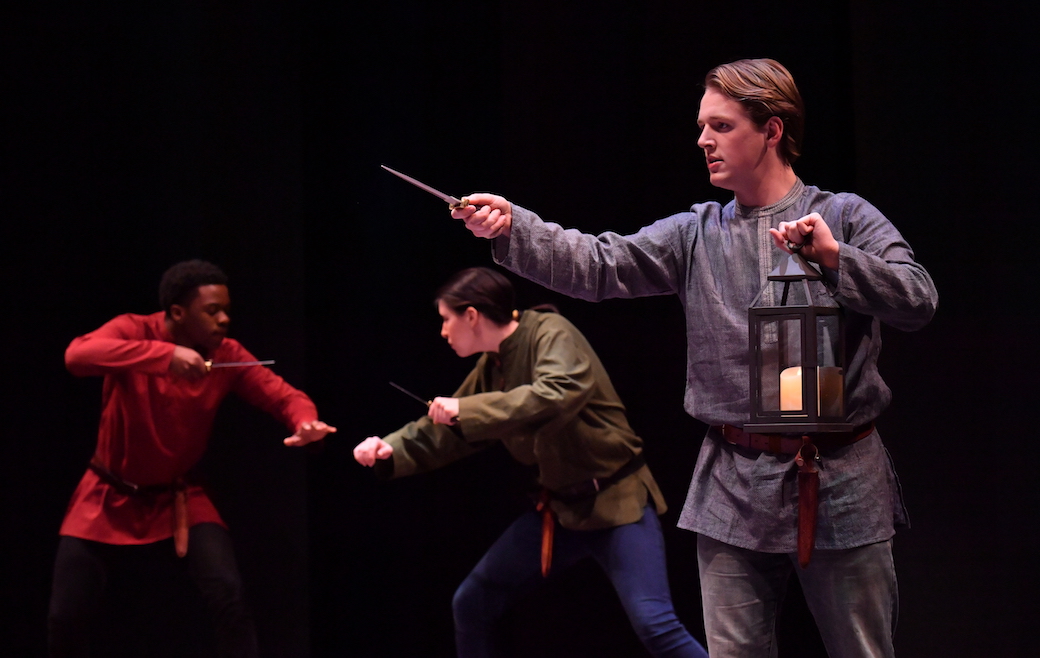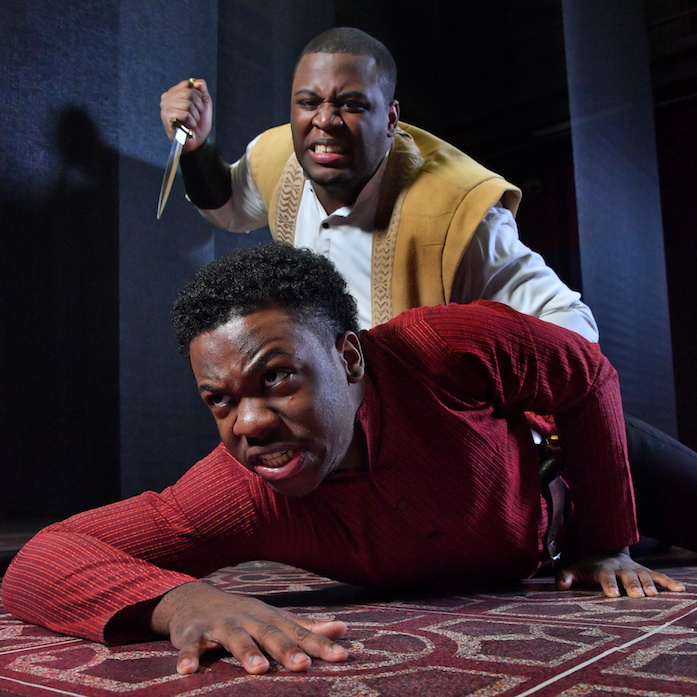Love, jealousy, race, betrayal…..it must be Shakespeare
TU students unpack complex characters
By Sedonia Martin on April 9, 2018

William Shakespeare's Othello is an epic story about race, love, jealousy and betrayal. Originally set in 16th-century Venice and Cyprus, Towson University’s Department of Theatre Arts’ production, presented through Saturday, April 14 in the Center for the Arts Studio Theatre, does not reference a time period.
Yet the story is timeless. It centers on Othello the Moor, a noble black general in the Venetian army, who has secretly married a beautiful white woman, Desdemona, the daughter of Brabantio a prominent senator.

Othello’s ensign, Iago, harbors a secret jealousy and resentment toward Othello. Passed over for a promotion and determined to get revenge, Iago manipulates everyone around him, hatching a devious plot that leads to distrust, broken friendships, murder and suicide.
The central themes resonate with contemporary issues—the role of women, ambition and betrayal. Perhaps the most challenging theme is race, demonstrated by the marriage of Othello and Desdemona. The many references to this mixed marriage illustrate the complexities of this relationship even in Shakespeare’s lifetime.
“I think Othello is one of Shakespeare's most popular plays,” says Isaiah Harvey ’19, who plays Iago. “This is the only one that stars a dark-skinned character.” Jealousy, trust, faith and not knowing who is a friend—“these are all things that a modern audience can connect with on a pretty primal level,” he explained.
Tyrell Brown ’19, who plays Othello, agrees, “This play has so much power and is filled with love and passion through all the characters. I think it’s something that many people can relate to.”
Brown and Harvey display a natural chemistry and easy manner on the stage as they portray these complex and troubled characters.
Harvey said he relates to Iago’s “pent up aggression and resentment. Iago is an observer, constantly surveying what's happening around him and choosing not to speak until he knows exactly when he should and what to say. I find that I do that occasionally in my everyday life. I'm naturally an observer.”
Tyrell said he shares attributes with Othello. “We are both very passionate about the way we feel things. I know sometimes when I have a thought, I like to let people know what is on my mind. Othello really cares; he cares for people so much that he makes sure to do whatever he needs to do for the ones that he loves. He cares about his job and takes his job very seriously.”
Brown and Harvey have embraced these characters which makes for striking and commanding performances.
The challenge of playing Iago is remembering his complexities, Harvey said. “Iago is a character who can very often be mistaken for a typical mustache twirling villain,” he added. “But if he's played that way, then a lot of the play doesn't really work.”
Tyrell’s challenge was showing how quickly Othello changes his feelings.
“He is easily persuaded by the energy around him, so all he needs is someone to tell him how to feel and he will do it,” Tyrell said. His moods and feeling change often. “I need to make sure that the audience can resonate with the character, to be able to stay with me, my emotions, and the passion that I’m feeling, not just think it is me screaming at another character.”
TU Department of Theatre Arts professor Peter Wray is directing the production. He helped prepare his students for the dynamic roller-coaster ride of emotions shared by these two characters.
Wray helped Harvey understand that Iago wasn’t infallible.
“He messes up; he almost gets exposed several times throughout the play,” Harvey said. “Iago's strength is being able to think on his feet and solve problems more quickly than those problems can, for lack of a better term, screw him over. And that's the fun part. He doesn't know that he's going to succeed and that's richer for me as an actor because it gives me places to go.”
“One thing Peter Wray, said to me a lot was that if you understand what you are saying and why you are saying it, then the audience will understand as well,” added Brown. “The best thing about this department is the opportunities that it gives to its students. There are so many things for theatre students to do from auditions throughout the university, to opportunities like scholarships.”
Brown and Harvey are from Baltimore. While future careers plans are still developing, these thespians will definitely be working in the theatre industry.